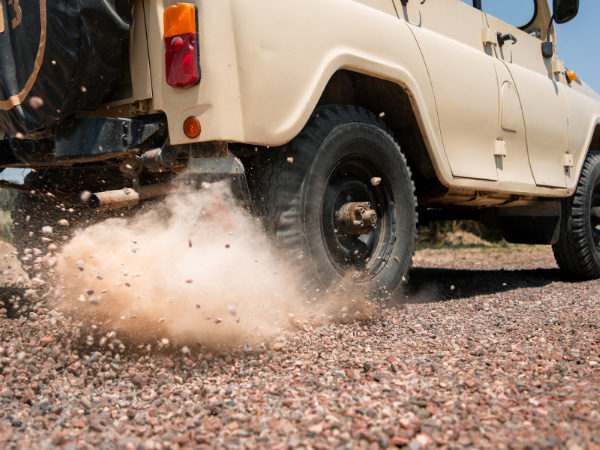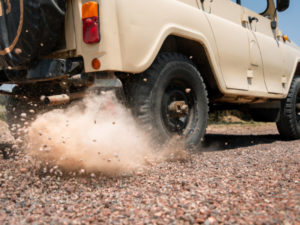The only thing more irritating than hearing a grinding noise coming from your 4-wheel drive while you are making a turn is hearing that grinding noise and not having a clue what is causing it.
If you hear a grinding noise while turning you could be dealing with several different issues.
Most Common Causes for Grinding

Issues With Your Drivetrain
One of the first things I can think of that will cause you to hear a grinding noise when you are making a turn in your 4-wheel drive is the drivetrain being in a bind.
When your drivetrain gets in a bind then torque is distributed through the transfer case and the result is that irritating grinding noise. You might also find the steering wheel difficult to turn if this is happening.
Your Lift Kit
Believe it or not that lift kit you installed may be the reason your drivetrain is getting in a bind and causing weird noises.
When you put in the extreme lift kits you alter the angle at which the drivetrain is in and the result is tension and binding.
Improper installation of the lift kit is one of the main reasons people have trouble with them. When you install a lift kit there are going to be other components that you have to change or adjust so the vehicle can operate properly.
Things You May Need to Replace when Installing a Lift Kit
- Shock Absorbers
- You may need to re-gear the vehicle so new ring and pinion gears may be needed
- Exhaust components
- Brake lines
- Carrier barrier drop brackets
- Axle shims
- The driveshaft
Solution:
The best thing you can do if the lift kit is causing any problems with the operation of the vehicle is go see a suspension specialist and see what other components you need to change to get the drivetrain positioned at the best possible angle.
4-Wheel Drive Gears Not Engaged Completely
If your 4-wheel drive gears did not engage completely then you could hear some grinding noises when you are trying to make a turn.
Solution:
Stop the vehicle and shift it out of the 4-wheel drive and then back into 4-wheel drive. Never ignore or disregard unusual sounds because they may be an alert telling you something big is about to happen.
Wheel Bearing Issues
The wheel bearings are the go-between from the axle to the wheel. The bearings reduce or stop the friction between these metal components. If the bearings wear out then you get metal rubbing against metal and the sound of grinding when you are turning.
Along with the grinding noises there are other symptoms you may not realize are associated with your wheel bearings. These include but are not limited to:
- Excessive play on the steering wheel. If your steering wheel is getting slack then you need to check those bearings.
- A vibration in the steering wheel that is not associated with the surface you are driving on.
- A humming or growling noise that seems to happen when you accelerate.
- A loud whining noise that you hear when driving.
All of these symptoms are indicators that something may be wrong with the bearings on the vehicle.
What Makes The Bearings Fail?
There are several factors that can be associated with a failing bearing.
- When the bearing is installed using a hammer or impact wrench to get them in place can result in a shorter life expectancy.
- Driving over rough surfaces like off-road driving or even on streets with potholes
- Driving through excessive water and mud
- Using stiffer shock absorbers
- Installing tires with lower tread walls
- Installing bigger or wider rims than specified by the manufacturer
Checking The Bearings
It is pretty easy to check and see if bearings could be your problem. This will not cost anything.
- Park the vehicle on a flat and level spot. It is best if the surface it is parked on is firm like concrete.
- Get out your car-jack and your jack stands
- You need to jack the car up high enough to lift the wheel you are checking off of the ground. You need the wheel to have no weight on it.
- Do not get under the vehicle
- Take one hand and place it on the top of the tire and try to rock it
- There should be very little if any movement that you can make at this time. If you can move the tire pretty freely it is a sign that your bearings are no longer doing their job.
Another Simple Check
- Jack the car up and place jack stands in place to make it secure
- Make sure the tire you are checking is lifted off of the ground so no weight is resting on it
- If your vehicle has a manual transmission take it out of gear, if you drive something with an automatic tranny then just put the transmission in neutral
- Kneel down beside the tire you are checking
- Grasp the tire and rotate it
- While the tire is rotating listen carefully for any sounds
- You are also feeling to see if the tire is difficult to rotate or if there are rough spots while you rotate.
- Put the car back in the park or into gear prior to lowering it back to the ground
Solution:
Replace the bearings as soon as possible.
Keep a close eye on your bearings and be sure that you keep them packed in grease.
Worn Brakes
Your brake pads apply the pressure that allows your wheels to stop rotating when you want to stop. If the brake pad starts to wear thin then you do not have a cushion and you have two metal pieces rubbing together when you try to stop.
The result is a grinding or squealing noise. Some people have even experienced smoke and fire as a result of the metal against metal irritation.
Solution
Change the brake pads and have your rotor checked for damages. You should really consult a brake specialist when anything is wrong with your brakes.
Frequently Asked Questions
What Could Cause A Grinding Noise When Turning?
This can be something as simple as driving on the wrong surface or as critical as a broken driveshaft.
How Do You Know If Your 4-Wheel Drive is Going Out?
There are a lot of signs that your 4-wheel drive is going out. They include strange grinding or clunking noises, difficulty in steering and your 4-wheel drive may not engage fully.
Could my Grinding Noise When Turning Be Caused By A Broken Tie Rod?
Absolutely. When the tie rod starts to get loose or is broken the result can be some irritating whining, clunking, or grinding noises.
More Interesting Jeep Articles
Are Jeep Wranglers Manual or Automatic Transmission?
How to Put Jeep Cherokee in 4 Wheel Drive
Do Jeep Wranglers Have a Backup Camera?
How to Tune a CB Antenna without an SWR Meter
Final Thoughts
Grinding, clunking, whining, and any other strange noises you hear while driving are reasons for concern. When you are driving pay close attention to any unusual sounds so you can prevent possible breakdowns or accidents. If you cannot find the reason for the noise on your own take it to a professional and let them check it over before you decide that the car is okay to drive.

